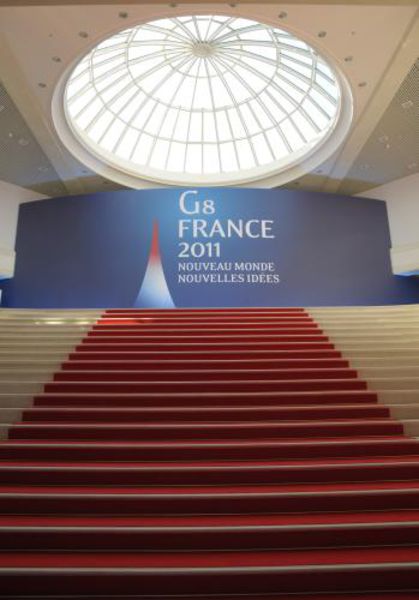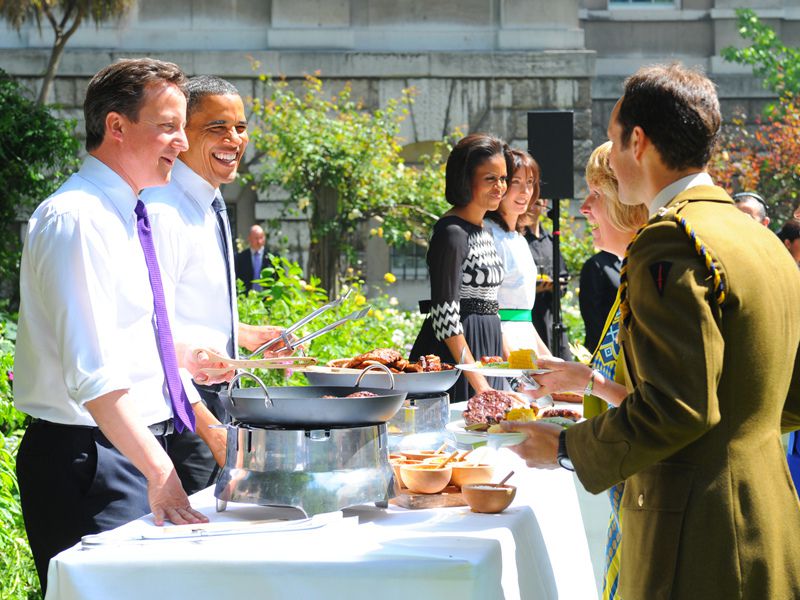G8 leaders are discussing the Arab spring and the selection of the next IMF head
Ralitsa Kovacheva, May 26, 2011
 The French city of Deauville is hosting the two-day summit of the leaders of the eight most industrialised countries. The G8 is part of the bigger Group of 20, this year chaired by France.
The French city of Deauville is hosting the two-day summit of the leaders of the eight most industrialised countries. The G8 is part of the bigger Group of 20, this year chaired by France.
The Arab spring clearly appears to be the main issue of the Deauville Summit. The eight leaders will seek ways to help politically and economically the nations fighting for democracy in North Africa and the Middle East. In this respect, especially insistent will be US President Barack Obama and British Prime Minister David Cameron, who announced that they would push their G8 partners “for a major programme of economic and political support for those countries seeking to reform.” Tomorrow the leaders will meet with delegations from Egypt and Tunisia, with international organisations as the UN, the World Bank, the IMF, the Arab League and some African leaders and organisations.
In a joint letter to their G8 colleagues, US Secretary of State Hillary Clinton and  Treasury Secretary Timothy Geithner are calling for a strong support for a Joint Action Plan for Tunisia and Egypt, so that the transition to democracy can be successful and these countries to become models for the region. They insist the creditors of Egypt to follow the US.example and implement debt swaps, which will “enable Egypt to channel its debt payments toward underwriting swift, sustainable job creation”. Their third proposal is the European Bank for Reconstruction and Development (EBRD) to engage in support for the private sector development in the region, like it did during the democratic changes in Central and Eastern Europe.
Treasury Secretary Timothy Geithner are calling for a strong support for a Joint Action Plan for Tunisia and Egypt, so that the transition to democracy can be successful and these countries to become models for the region. They insist the creditors of Egypt to follow the US.example and implement debt swaps, which will “enable Egypt to channel its debt payments toward underwriting swift, sustainable job creation”. Their third proposal is the European Bank for Reconstruction and Development (EBRD) to engage in support for the private sector development in the region, like it did during the democratic changes in Central and Eastern Europe.
On two occasions the letter makes the analogy with the transition in Central and Eastern Europe 20 years ago. It is being recalled that President Obama has announced a comprehensive Trade and Investment Partnership Initiative in the Middle East and North Africa, in order to increase market access and to create new economic opportunities. “Just as membership in the European Union served as a powerful incentive for economic transformation in Central and Eastern Europe after the Cold War, so should the prospect of participating in an integrated and dynamic regional economy create a powerful force for reform in the Middle East and North Africa”.
Another important topic will be nuclear safety in the context of the accident at Japanese nuclear plant Fukushima. The EU has already announced that it would start stress tests of its nuclear power plants with an emphasis on resilience to earthquakes. Within the same session climate change will be discussed too.
 Although missing from the official programme, the issue of selecting a new IMF head is likely to dominate a major part of the forum and the bilateral meetings. As you know, the incumbent IMF Director, Dominique Strauss-Kahn, resigned after being accused of a sexual offense in the United States. The EU insists his successor to be a European and the French finance minister, Ms Christine Lagarde, is the favourite for the post. Her candidacy has already been backed by German Chancellor Angela Merkel and Finance Minister Wolfgang Schäuble, British Chancellor of the Exchequer George Osborne, European Commission President Jose Manuel Barroso. It is expected at the Deauville Summit support for Ms Lagarde to be asked from the US.
Although missing from the official programme, the issue of selecting a new IMF head is likely to dominate a major part of the forum and the bilateral meetings. As you know, the incumbent IMF Director, Dominique Strauss-Kahn, resigned after being accused of a sexual offense in the United States. The EU insists his successor to be a European and the French finance minister, Ms Christine Lagarde, is the favourite for the post. Her candidacy has already been backed by German Chancellor Angela Merkel and Finance Minister Wolfgang Schäuble, British Chancellor of the Exchequer George Osborne, European Commission President Jose Manuel Barroso. It is expected at the Deauville Summit support for Ms Lagarde to be asked from the US.
The so called BRIC countries (Brazil, Russia, China and India + South Africa), however, issued a joint letter, which states that they were “concerned with public statements made recently by high-level European officials to the effect that the the position of Managing Director should continue to be occupied by a European.” BRIC leaders also said that “adequate representation of emerging market and developing members in the Fund's management is critical to its legitimacy and effectiveness.”
From all the above we can judge that intense discussions are expected in Deauville, with perhaps an unexpected end. euinside will let you know about the most interesting of the discussions and results of the two-day Summit. For more information follow euinside.eu, and our pages on Twitter and Facebook.
 | © © Presidency of the French Republic - C. Alix
| © © Presidency of the French Republic - C. Alix | © European Commission- Audiovisual Services
| © European Commission- Audiovisual Services  | © Crown copyright
| © Crown copyright